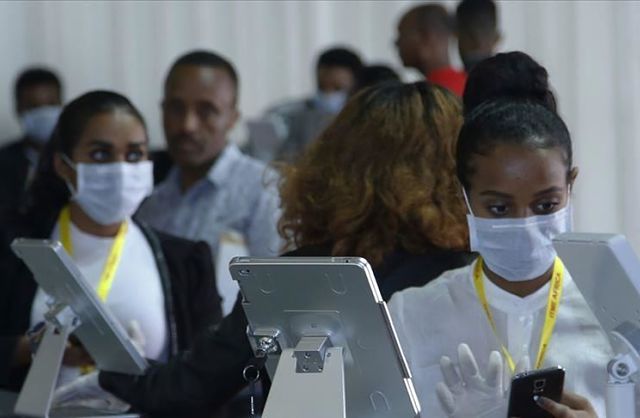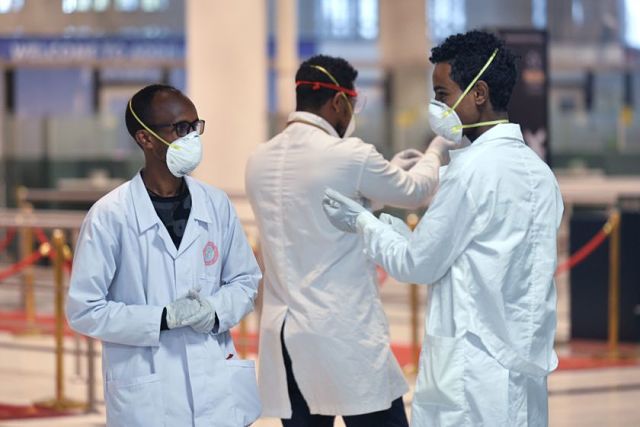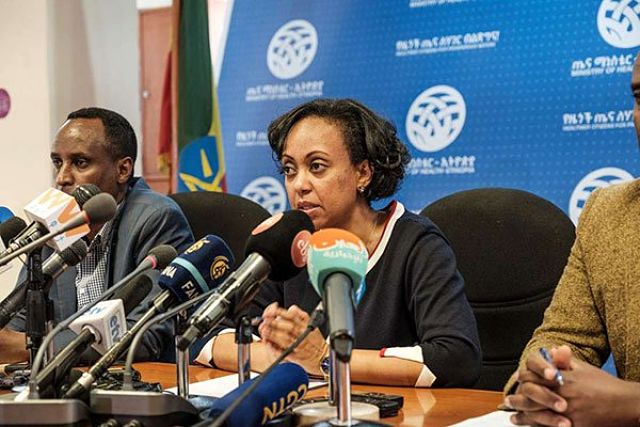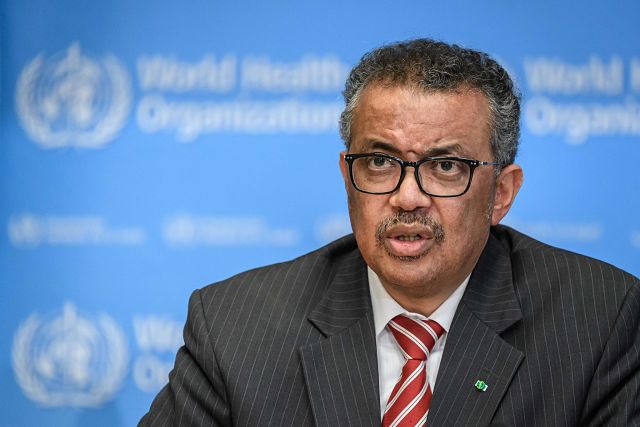CNBC
Updated: March 18, 2020
The World Health Organization’s top official criticized some nations for not doing enough to detect and contain the deadly coronavirus that’s infected more than 174,000 people across the world.
There’s been a rapid escalation of COVID-19 cases over the past week, WHO Director-General Tedros Adhanom Ghebreyesus told reporters at a virtual press conference Monday. “But we have not seen an urgent enough escalation in testing, isolation and contact tracing, which is the backbone of the response,” he said.
“We have a simple message for all countries: Test, test, test. Test every suspected case. If they test positive, isolate them and find out who they have been in contact with two days before they developed symptoms and test those people, too,” Tedros said.
Tedros didn’t single out any one country, but state and local leaders in the U.S. have heavily criticized the Trump administration and U.S. Centers for Disease Control and Prevention for delaying and limiting who could get tested in the U.S.
At the beginning of the outbreak, the CDC limited testing to people who had recently traveled to China and showed symptoms, or people who were symptomatic and exposed to someone with a confirmed case. The agency has since expanded its guidelines to include people showing symptoms who are already in the hospital or with underlying health conditions.
“For any country, one of the most important things is the political commitment at the highest level,” Tedros said. “All countries should be able to test all suspected cases. They cannot fight this pandemic blindfolded; they should know where the cases are.”
On Friday, New York Gov. Andrew Cuomo said the state was ramping up its testing, having just received federal approval to allow 28 labs across the state to begin running coronavirus tests. He said the state should be able to process 6,000 a day starting next week. The state had been able to run a total of just 3,000 tests so far, he said.
Federal regulators gave private labs, including LabCorp and Quest Diagnostics, approval on Feb. 28 to start running coronavirus tests, and Vice President Mike Pence announced expanded testing capabilities across the U.S. over the weekend.
“There’s no doubt that we are missing cases. I think we need to be realistic about this,” said Dr. Maria Van Kerkhove, head of WHO’s emerging diseases and zoonosis unit.
In treating patients, Tedros said, countries should first treat people who have underlying conditions. Some countries have converted stadiums and gyms to care for mild cases to free up hospitals for severe and critical cases, he said.
In Korea, where the virus spread rapidly last month, health officials rolled out an aggressive testing regime that processed tests for more than 259,000 people and confirmed more than 8,000 infections, according to the Korean CDC. In the U.S. more than 22,000 people have been tested at CDC and public health labs, according to the U.S. CDC. That does not include tests run by commercial labs, some of which were authorized last week to begin automated testing.
“Once again, our key message is: Test, test, test. This is a serious disease. Also the evidence we have suggests that those over 60 are at highest risk. Young people, including children, have died,” Tedros said.
—
UPDATE: Ethiopia Closes Schools, Bans Public Events
By Addis Getachew
UPDATEd: March 16th, 2020
ADDIS ABABA — Ethiopia on Monday closed schools across the country and banned all public gatherings, including sports events, for 15 days.
The decision was announced by Prime Minister Abiy Ahmed after consultations with top officials on measures to avert a COVID-19 outbreak in the country.
In a televised message, the premier said the steps were necessary after four new cases were confirmed in Ethiopia over the past 24 hours, raising the total to five.
Among the new cases are two Japanese and an Ethiopian national who had been in contact with the country’s first patient, a 48-year-old Japanese citizen.
The fourth case was an Ethiopian man who recently returned from Dubai.

Prime Minister Abiy Ahmed says steps necessary after new coronavirus cases rise. (AA)
Ahmed said his government was making efforts to provide protective face masks, medical kits, and disinfectants, including sanitizers, for the public.
He announced that government vehicles would be used for public transport to ease the burden on the existing system.
With only primary and secondary schools being closed for now, Abiy said that university students would be provided all essential care at their respective campuses.
After emerging in Wuhan, China, last December, the coronavirus has now spread to at least 146 countries and territories, according to the World Health Organization (WHO).
The global death toll is nearly 6,500, with around 165,000 confirmed cases.
While the WHO recently declared the global outbreak a pandemic, its head Tedros Adhanom Ghebreyesus said the situation was controllable.
In his remarks at a March 3 briefing on COVID-19, Tedros also pointed out that the mortality rate from the virus was around 3.4%.
—
Africa Turns The Tables: Restricts Travel from U.S. & Europe to Halt COVID-19

Ethiopian health workers prepare to screen passengers for COVID-19 at the Addis Ababa airport. Most cases of COVID-19 in Africa have so far been imported by travelers. (Photo: Michael Tewelde /Getty Images)
The Intercept
March 15 2020
AS THE NOVEL coronavirus rages through the world and spreads rapidly in the U.S., Africa is the least-affected continent at the moment, with less than 300 reported cases in roughly half of its 54 countries so far. A number of media outlets have reacted with a confounded tone, surprised that Africa does not have more cases and wondering if the low numbers are due to a lack of testing.
Health officials say that the main reason the continent has thus far been spared major outbreaks is due to the infrastructure set up during the Ebola epidemic that is still in place, and lower overall international air travel rates. At the same time, they acknowledge that the picture is not all sunny — the virus in some countries is likely spreading unchecked. But in Nigeria, the continent’s largest country by population, investments in lab capacity and coordination with the World Health Organization (WHO) for testing have paid dividends. “Over the last three years, we have strengthened capacity at our National Reference Laboratory to provide molecular diagnosis for all epidemic prone diseases and highly infectious pathogens,” Chikwe Ihekweazu, the director of Nigeria’s Center for Disease Control, told The Conversation.
The pandemic is exposing major flaws in higher income countries’ health systems and turning the tables on decades of travel restrictions targeting Africans. When West Africa suffered from the Ebola crisis from 2014-2016, the region was often painted as a weak link in the global health system, and many airlines cut flights to Guinea, Liberia, and Sierra Leone. Four years later, Africa is at risk of contamination primarily from Europe, China, and the U.S. Besides Egypt, nearly all the continent’s confirmed cases have come from travelers from European or east Asian countries, though that looks likely to change soon as cases rise rapidly across the continent and community transmission becomes more likely.
In a dramatic shift in fortunes, African countries — whose citizens often have to prove their health status to even get a visa to travel to Europe — have moved swiftly to control arrivals from European countries. Ghana and Kenya announced new measures prohibiting travelers from countries affected by Covid-19, the first two African nations to put in place blanket travel bans, while Senegal and Kenya also announced school closures. The Democratic Republic of Congo imposed quarantine measures on travelers from Italy, France, China and Germany. After restricting travelers from high-risk countries to quarantine, Mauritania deported 15 Italian tourists and Tunisia deported 30 other Italians for violating theirs. Rwanda, Uganda, Mali, and others have imposed similar quarantine measure for European travelers, while across the continent, passengers are screened for their temperature at international airports. A Cameroonian news outlet reported higher arrivals from Italy due to people trying escape their coronavirus-infected country.
Dr. Craig Spencer, the American doctor who contracted the Ebola virus while providing emergency medical relief in Guinea in 2014, agrees the Ebola experience left many African countries better prepared. “There’s been a substantial increase in both the human resource capacity, the financial investment, and really, the logistical strengthening of public health and epidemic response capacity in sub-Saharan Africa,” Dr. Spencer, who is the Director of Global Health in Emergency Medicine at New York-Presbyterian/Columbia University Medical Center, told The Intercept.
WATCH: Coronavirus education through song | South African choir sings about COVID-19
—
List of African Countries with Coronavirus Grows as Kenya, Ethiopia, Sudan Report Cases

Dr Lia Tadesse, Minister of Health of Ethiopia, addresses a press conference after the first case of Covid-19 coronavirus was detected in Ethiopia, in Addis Ababa on March 13, 2020. (Photo: AFP)
France24
Africa had until now largely been spared the rapid spread of COVID-19, which has infected at least 135,000 people and killed around 5,000 worldwide.
Most of Africa’s reported cases were foreigners or people who had travelled abroad. Rapid testing and quarantines have been put in place to limit transmission.
But concerns are growing about the continent’s ability to handle the disease.
Cases have been reported in Morocco, Tunisia, Egypt, Algeria, Senegal, Togo, Cameroon, Burkina Faso, Democratic Republic of Congo, South Africa, Nigeria, Ivory Coast, Gabon, Ghana, Guinea, Sudan, Kenya and Ethiopia.
Mauritania’s health ministry said late on Friday that its first coronavirus patient is a European man – nationality not specified – who had returned to Nouakchott on March 9 and had since been in quarantine.
The numbers of cases in most of the countries are still in single figures…
—
WHO Declares Coronavirus a Pandemic

Tedros Adhanom Ghebreyesus, the World Health Organization’s director-general, on Wednesday. He called for countries to help protect one another against a common threat. (Getty Images)
The New York Times
Updated: March 11, 2020
Coronavirus Has Become a Pandemic, W.H.O. Says
The spread of the coronavirus is now a pandemic, officials at the World Health Organization said on Wednesday.
“We have rung the alarm bell loud and clear,” said Tedros Adhanom Ghebreyesus, the W.H.O.’s director-general.
Dr. Tedros called for countries to learn from one another’s successes, act in unison and help protect one another against a common threat.
“Find, isolate, test and treat every case, and trace every contact,” Dr. Tedros said. “Ready your hospitals. Protect and train your health care workers.”
“Let’s all look out for each other, because we’re in this together to do the right things with calm and to protect the citizens of the world.”
Although this is the first pandemic caused by a coronavirus, “we also believe that this is the first pandemic that is able to be controlled,” Dr. Tedros added.
He pointed several times to the success of China, which has cut new infections from over 3,500 a day in late January to a mere 24 in the most recent daily count. The world is watching to see whether China can keep its numbers down as it gradually releases millions of city dwellers from quarantine and lets them go back to work.
South Korea and Singapore have also begun to see cases drop. But the rest of the world is seeing alarmingly rapid rises.
The W.H.O. is emphatically not suggesting that the world should give up on containment, Dr. Tedros said.
“We are suggesting a blended strategy,” he said, referring to a blend of containment and mitigation. “We should double down. We should be more aggressive.”
—
Related:
How it spreads, infects: Coronavirus impact comes into focus
Coronavirus Sparks an Epidemic of People Helping People in Seattle
Tedros Adhanom Ghebreyesus: The Ethiopian at the Heart of the Coronavirus Fight